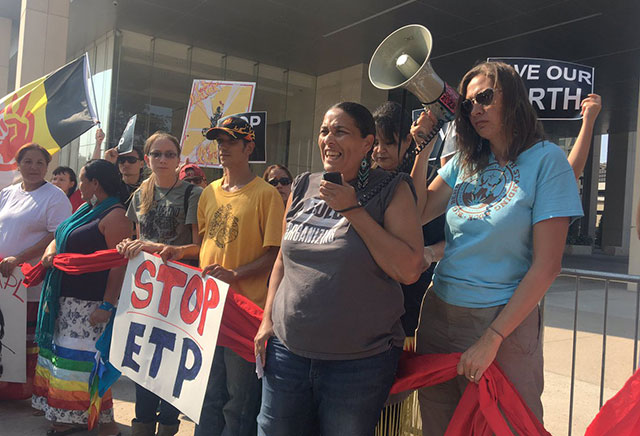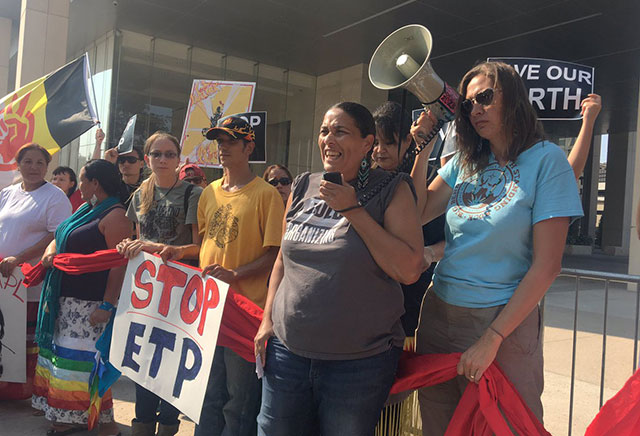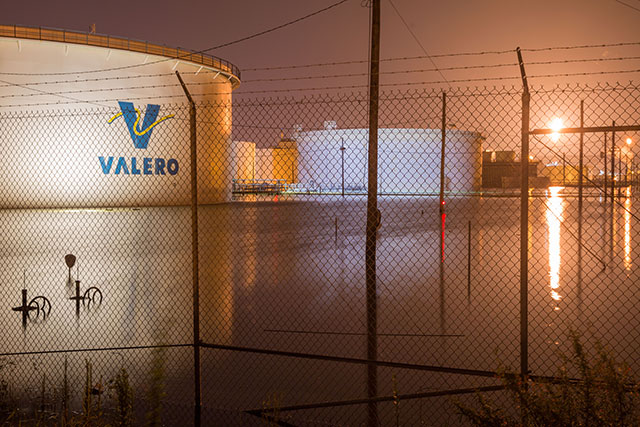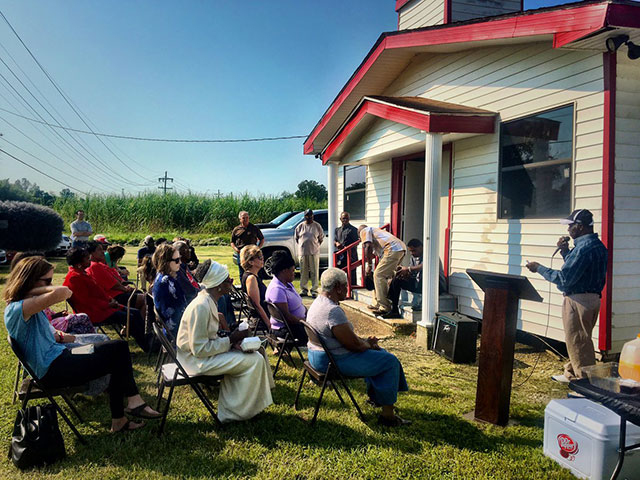
 Louisiana-based organizer Cherri Foytlin addresses a crowd of protesters at Energy Transfer Partners corporate headquarters in Dallas, Texas, on Friday. Indigenous and environmental activists from across the country demonstrated against the company’s pipeline projects, including the Bayou Bridge Pipeline, which would carry oil from east Texas across the sensitive wetlands of southern Louisiana. (Photo: Ethan Buckner / Earthworks)
Louisiana-based organizer Cherri Foytlin addresses a crowd of protesters at Energy Transfer Partners corporate headquarters in Dallas, Texas, on Friday. Indigenous and environmental activists from across the country demonstrated against the company’s pipeline projects, including the Bayou Bridge Pipeline, which would carry oil from east Texas across the sensitive wetlands of southern Louisiana. (Photo: Ethan Buckner / Earthworks)
As a longtime environmental justice activist and resident of Port Arthur, Texas, where Hurricane Harvey recently flooded neighborhoods and several large oil refineries, Hilton Kelley has a lot on his mind.
When Truthout reached Kelley on Tuesday, he had just finished posting a crowdfunding appeal for people affected by Hurricane Harvey and was turning to the next task at hand: his own flood-damaged home. Like his neighbors up and down the street, Kelley’s belongings were spread across the driveway as he waited with his granddaughter for FEMA officials to arrive and assess the damage.
“I’m right in the mix of this thing,” Kelley said. “I rushed to come back here to assist others and also to check on my home that had two feet of water in it.”
Kelley was in “survival-first mode,” with food, water and a dry place to spend the night among his top concerns. Then there are the troubled refineries working to restart production under the protection of a state waiver ordered by Texas Governor Gregg Abbott in response to the hurricane, which protects facilities from facing penalties for spewing toxic pollution.
A day earlier, the Valero refinery in Port Arthur released 6,116 pounds of sulfur dioxide gas into the air as it restarted operations in the middle of the night, according to state records. Sulfur dioxide causes burning in the nose and throat and is particularly harmful to children, the elderly and people with asthma.
“When it comes to the environment, there’s a shutdown [at the refinery], you have smoke coming from the derricks along with some fire, the smell and pungent odors,” Kelley said. “Where I’m at now, I don’t smell it, but when I go to the west end where the refineries are, it’s very apparent.”
The Valero refinery would go on to belch thousands of pounds of sulfur dioxide, carbon monoxide, volatile organic compounds and gases into the air as it lurched back to life over the following days, a practice known as “flaring” that occurs when aging refineries abruptly start up, shut down or malfunction.
 Floodwaters from Hurricane Harvey surround storage tanks at the Valero refinery in Port Arthur, Texas, on September 1. Petrochemical plants and refineries like this one released millions of pounds of toxic pollution into the air as they shut down and rebooted in the wake of the storm. (Photo: Alex Glustrum)
Floodwaters from Hurricane Harvey surround storage tanks at the Valero refinery in Port Arthur, Texas, on September 1. Petrochemical plants and refineries like this one released millions of pounds of toxic pollution into the air as they shut down and rebooted in the wake of the storm. (Photo: Alex Glustrum)
When combined with emissions from neighboring refineries and other facilities in the region, the numbers are staggering. By August 31, the refineries and petrochemical plants in south Texas had released 5 million pounds of pollution in the wake of Hurricane Harvey, including 1 million pounds of seven particularly dangerous toxic chemicals, such as benzene, hexane and toluene.
While some emissions were the result of storm damage, most were caused by standard procedures involving flaring. Flaring has become routine during major storms, and environmentalists say the oil industry has consistently been unwilling to spare the resources necessary to operate safely in emergencies, even as fossil fuels disrupt the climate and warm oceans, making hurricanes like Harvey more destructive.
“These facilities are located in a part of the world where there are terrible storms, and they are simply not prepared,” said Anne Rolfes, director of the Louisiana Bucket Brigade, an environmental group that tracks petrochemical pollution in Gulf communities.
The American Fuel and Petrochemical Association, a group that represents the industry, did not respond to a request for comment from Truthout.
Meanwhile, Hurricane Irma was brewing in the Atlantic, on its way to becoming one of the strongest hurricanes ever recorded in that part of the world and leaving a path of destruction across the Caribbean. At the time, there was no way to know whether Irma would turn up the Atlantic Coast or head across the Gulf toward Texas. (The storm is now forecast to move up Florida’s Gulf Coast.)
“If that’s the case, I’m going all the way to Dallas,” Kelley said. “I’m done, I’m tired.”
A Movement Grows Out of the Swamps
On Saturday, activists launched a colorful flotilla of boats, kayaks and rafts on a bayou in southern Louisiana to raise awareness about their fight against the Bayou Bridge Pipeline, a proposal to pipe oil from East Texas across much of southern Louisiana, including sensitive wetlands in the picturesque Atchafalaya Basin and southern coastal plains.
The flotilla was part of a national day of action against Energy Transfer Partners, the company behind several controversial pipeline projects, including the infamous Dakota Access pipeline (DAPL) and the Bayou Bridge Pipeline, which constitutes DAPL’s southern leg.
The company attracted global controversy last year as Native activists built a mass movement against DAPL, including the protest camps at Standing Rock in North Dakota that sustained resistance against the pipeline for many months last year, before the Trump administration came to power and set the stage for law enforcement to aggressively evict remaining water protectors.
Weaving down a bayou that supplies drinking water for Indigenous and Cajun communities and is threatened by pipeline accidents, the flotilla was one of the first public manifestations of the L’eau Est La Vie (Water is Life) Camp, an activist enclave hidden in the swamps that draws its inspiration directly from Standing Rock.
With several activists having just returned from a nonviolent direct action at Energy Transfer Partners corporate headquarters in Dallas on Friday, L’eau Est La Vie is also a sign that resistance to fossil fuels in the South is becoming more confrontational as temperatures and sea levels rise. The action in Dallas grew tense after local police and security guards tried to shut down an Indigenous drum ceremony, and activists later marched to the home of Energy Transfer Partners CEO Kelcy Warren, a gated mansion nearby.
 A wooden signs announces a prayer service against the Bayou Bridge Pipeline at St. Paul Baptist Church in rural St. James Parish, Louisiana, where local pastors say, “prayer can stop a pipeline.” Grassroots opposition the oil industry is growing across the Gulf South. (Photo: Ethan Buckner / Earthworks)
A wooden signs announces a prayer service against the Bayou Bridge Pipeline at St. Paul Baptist Church in rural St. James Parish, Louisiana, where local pastors say, “prayer can stop a pipeline.” Grassroots opposition the oil industry is growing across the Gulf South. (Photo: Ethan Buckner / Earthworks)
For years, groups like the Bucket Brigade and Kelley’s local organization in Port Arthur, the Community In-Power and Development Association, have catalogued petrochemical pollution in the Gulf by flying planes over oil spills, digging through government databases, collecting satellite images of pollution, taking air and water samples and empowering residents to report pollution on their own.
Armed with the resulting data, they wrangle with regulators and well-funded industry groups over rules and enforcement measures to reign in pollution, only to find themselves up against the overwhelming power of the fossil fuel industry and the stream of riches it pulls from the oil and gas wells that dot the Gulf of Mexico and its coastal plains.
“These regulations that we want are obviously good and really necessary, but the playing field is so unequal, and we are being smothered … by chemicals,” Rolfes said. “Look at what’s happened in Harvey. We don’t just need a regulation here or enforcement there, although that is necessary. We need a wholesale shift, away from a petroleum and fossil fuel-based economy.”
As severe storms and floods intensify and become more common across the Gulf region, so does grassroots resistance to the fossil fuel industry that dominates its landscapes and drives climate disruption. Activists are not just demanding environmental justice in the face of pollution, but a “just transition” away from a fossil fuels altogether.
The protesters are growing in numbers, and their actions are becoming more direct, as they set their sights on opposing both existing oil and gas infrastructure as well as blocking new pipelines and plants from being constructed. For environmentalists in the Gulf, where sea levels are rising and precious wetlands that protect against floods and storm surges are rapidly melting into the sea, this resistance is becoming a matter of survival.
Resistance in Climate Ground Zero
As Kelley and his family began putting their lives back together in Port Arthur, activist and L’eau Est La Vie organizer Cherri Foytlin was volunteering at an evacuation center an hour’s drive east in Lake Charles, Louisiana, where people were arriving with only “the clothes on their back.”
Foytlin said one of the big concerns among people showing up from Port Arthur was whether cancerous chemicals like benzene were floating in the floodwaters they waded through to get to and from their homes. The health effects of chemicals leaching from damaged refineries and flaring into the air may not become apparent until years down the road.
“Most of those refineries, if not all of them, went underwater, and there were a lot of concerns about what was actually in the water, and we don’t know because it’s proprietary information,” Foytlin told Truthout on Wednesday.
 Cherri Foytlin, who joined the water protectors at Standing Rock during the protests against Dakota Access pipeline last year, navigates a bayou on a raft from the L’eau Est La Vie (Water is Life) Camp in southern Louisiana, where a movement to stop the Bayou Bridge Pipeline is emerging from the swamp. (Photo: Ethan Buckner / Earthworks)
Cherri Foytlin, who joined the water protectors at Standing Rock during the protests against Dakota Access pipeline last year, navigates a bayou on a raft from the L’eau Est La Vie (Water is Life) Camp in southern Louisiana, where a movement to stop the Bayou Bridge Pipeline is emerging from the swamp. (Photo: Ethan Buckner / Earthworks)
As Truthout reported, the Trump administration delayed chemical safety rules for industrial facilities earlier this year, including rules that would have required chemical plants and refineries to share information about toxic chemicals with emergency response planners in case of a disaster.
The petrochemical industry complained that the rules would require costly equipment upgrades and could force facilities to share sensitive information with first responders. The attorneys general of Texas and Louisiana even invoked the threat of that information falling into the hands of “terrorists” in a letter requesting that the rules be delayed.
“But let’s look at who is really gassing our communities,” Rolfes said. “It’s not ISIS over in Houston. It’s Arkema, it’s Motiva, it’s these companies with these chemical plants.”
For Foytlin, there is a direct correlation between leaders in Washington and problems faced by residents of the Gulf coast. The same pollution Houston faces in the wake of Harvey occurs when storms hit refineries and chemicals plants near New Orleans, Mobile and other cities along the Gulf Coast.
Foytlin lives in Rayne, Louisiana, and her house has flooded twice in the past year: once during a 1,000-year flood that devastated central Louisiana last summer, and again during heavy rains this spring.
“It’s a situation where our leaders are intentionally putting our lives in danger … especially the Trump administration,” Foytlin said.
Foytlin said it’s clear that climate disruption is causing unusually strong storms and heavy rains, and oil and gas development has damaged wetlands that soak up excess water and prevent flooding. That’s one reason why Foytlin has become a central figure in the fight to stop the Bayou Bridge Pipeline.
“Who keeps building [oil] infrastructure on a coastline that keeps melting away and keeps being hit by storms?” Foytlin said.
The push to stop the Bayou Bridge Pipeline has become a central fight for activists opposing the fossil fuel industry in Louisiana and across the Gulf South. Protests and rallies against the pipeline have been held in New Orleans, Baton Rouge and across the state, and environmental groups have filed a lawsuit to block a permit needed for construction.
 Local pastors lead a prayer service against the Bayou Bridge Pipeline in St. James Parish, Louisiana. (Photo: Ethan Buckner / Earthworks)
Local pastors lead a prayer service against the Bayou Bridge Pipeline in St. James Parish, Louisiana. (Photo: Ethan Buckner / Earthworks)
In February, as Donald Trump took office and authorities prepared to clear the Standing Rock camps, a permit hearing for the Bayou Bridge proposal became rowdy after Energy Transfer Partners told Foytlin and about 200 other anti-pipeline protesters that the company shares the same “vision” for the country as Trump. The protesters responded loudly with a promise to keep fighting even as state authorities sign approvals for the project.
The movement is not just about stopping pipelines, although they are needed to carry the oil and gas. The Gulf South is both a center of fossil fuel production and an area experiencing firsthand the impacts of climate disruption, making it a focus for the movement to transition away from fossil fuels.
Last year, hundreds of protesters crashed an offshore oil and gas leasing auction at the Superdome in New Orleans, interrupting the proceedings and generating headlines nationwide. Weeks later, it was environmental justice activists from Gulf communities who led a massive march against offshore drilling in Washington, DC.
The growing movement faces many challenges. For example, Gulf states like Louisiana are economically dependent on the oil and gas industry for jobs and tax revenues. However, despite the riches the industry pulls from its wells, the Gulf South remains one of the poorest regions of the country. And Foytlin points out that the workers who recently installed solar panels on her house were making $30 an hour, and rooftops are much easier to get to than offshore oil rigs.
“One thing is, there is the renewable sector, which is growing by leaps and bounds … there would be more jobs if we made that transition to a cleaner future,” Foytlin said.
The Gulf region may be ground zero for the environmental destruction caused by fossil fuel production and climate disruption, but it’s also the site of a groundswell of struggle. Gulf activists are fighting for a world where economies and communities are not dominated by oil, gas and petrochemicals. Their vision is not just of a different future for the people of the Gulf, but for everyone else as well.
Join us in defending the truth before it’s too late
The future of independent journalism is uncertain, and the consequences of losing it are too grave to ignore. To ensure Truthout remains safe, strong, and free, we need to raise $27,000 in the next 24 hours. Every dollar raised goes directly toward the costs of producing news you can trust.
Please give what you can — because by supporting us with a tax-deductible donation, you’re not just preserving a source of news, you’re helping to safeguard what’s left of our democracy.